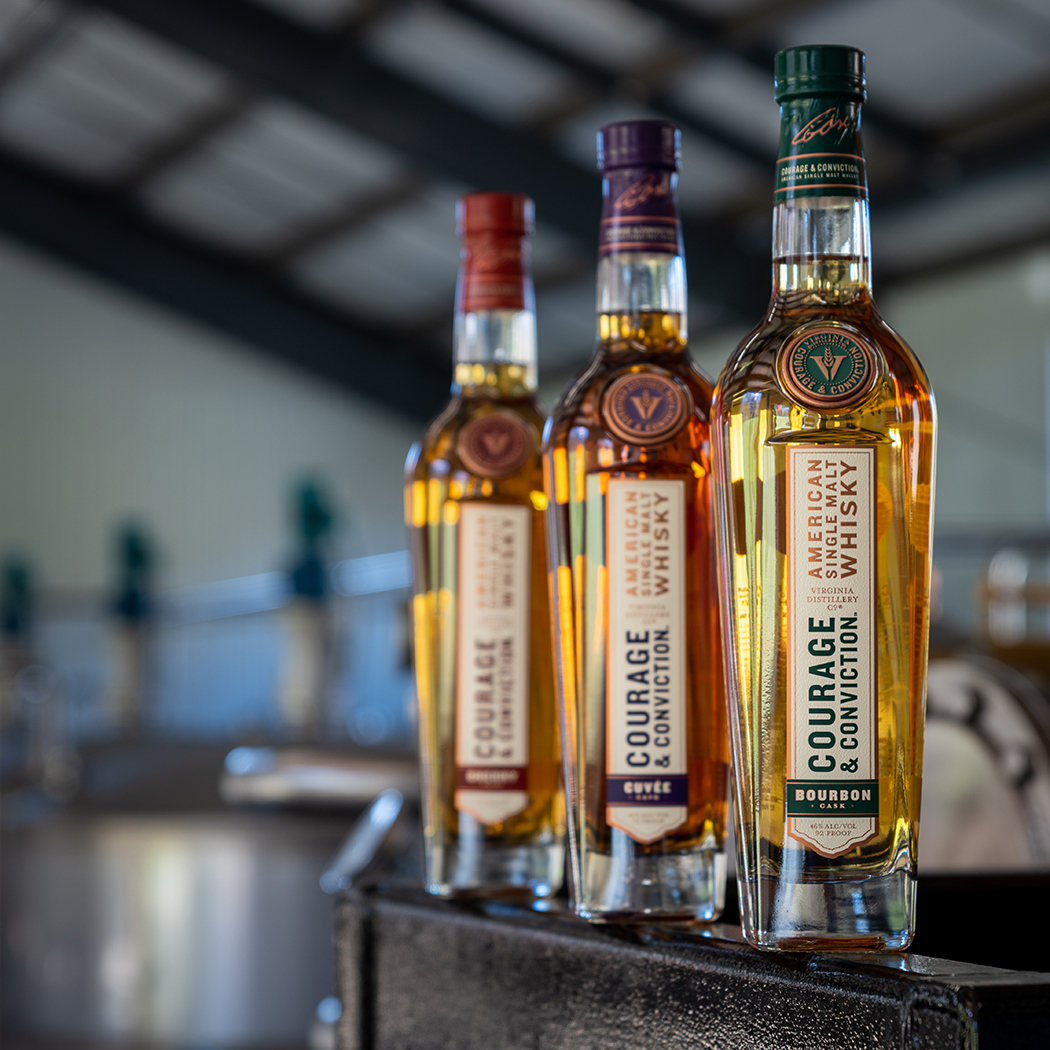Ivar Aass and his wife, Sarah Barrett, moved to Charlottesville from New York in 2012 with a singular purpose: to distill high-quality spirits in a place that, in Aass’ own words, has “heaps of local pride and an understanding and appreciation of all good drink and food.”
In 2015, Aass and Barrett’s Spirit Lab Distilling became the first distillery in the City of Charlottesville. While Aass says his previous experience in the wine and spirits industry was an asset, he faced numerous regulatory challenges at both the city and state level. This led to a “quiet start,” he says, but he feels genuinely moved by the growth and support the business has received in the past six years. “Our local fans really validate why Charlottesville was the perfect spot for us [to start a distillery].”
Spirit Lab makes a wide range of products sourced from local ingredients, but Aass’ true love is his own version of an American single malt whiskey. With a nod to tradition, along with the goal of a unique and truly local expression, the small batches he produces are a hit with fans and restaurants as far away as Washington, D.C.
Virginia Distillery Company, in nearby Lovingston, recently released its American single malt whiskey, Courage & Conviction, after many years of anticipation. With distilled products such as single malt whiskey, distillation is just the beginning of the process. The spirit must also rest in barrels for extended aging, which adds the color, flavor, and complexity that is so sought after. When Virginia Distillery Company was founded in 2011, it started with whiskey distilled overseas and finished locally. Soon, its popular Virginia-Highland product line featured whiskey that was a blend of local and Scottish distillate.
The new American Single Malt represents the first product in its line that is made from 100 percent North American-sourced malted barley, fulfilling a vision almost a decade in the making. The initial release is a blend that is 50 percent aged in Kentucky bourbon casks, 25 percent aged in sherry casks, and 25 percent aged in repurposed red wine casks. Recently released solo cask offerings may be of even more interest to whiskey aficionados as they showcase bourbon casks, sherry casks, and wine casks as single bottlings without blending. The four new singles also earned several awards from the American Spirits Council of Tasters in June 2021.
Ian Glomski started Vitae Spirits Distillery in Charlottesville after “what could possibly be called a midlife crisis.” Glomski had previous experience in beer and wine, and, like Aass, found the regulatory hurdles difficult. “Virginia ABC implements a convoluted set of statutes and regulations that are a spaghetti-mess of layers that have built up ever since the end of prohibition,” he says.
At Vitae, which was founded in 2015, the spirits are distilled from sugar cane, in the tradition of rum making. This base spirit is the foundation of such products as gin, coffee and orange liqueurs, and barrel-aged products. With all of these, Vitae focuses on local ingredients and features several collaborations with other area producers.
Both Glomski and Aass hope for a day when the regulatory landscape is friendlier to growth and sales. Glomski bemoans the “current set of laws that is specifically designed to throttle growth and success” of the industry. He would like a relaxation of regulations controlling what can be served in tasting rooms, an extension of wholesale pricing (distilleries must pay retail price to buy their own product from the state), and more attention given by ABC stores to local distilleries as compared to large international corporations.
Aass explains that Virginia takes a “massive” amount of the bottle price that would otherwise go to the producer. Supporting local makers is in many ways synonymous with looking for high quality,” he says, and the very high cost of doing business threatens the quality of the product. His hope is that legislators will begin to see Virginia craft distilleries less as a small source of tax revenue and more as a source of quality and local pride. “There are plenty of mediocre spirits being made by the huge distilleries, why add to that?” says Aass.
Sip and savor
Charlottesville-area consumers now have access to a wide range of well-crafted spirits, the result of many years of vision, planning, hard work, and persistence.
Virginia Distillery Company
(vadistillery.com)
Courage & Conviction now available as single bottlings of bourbon, sherry, and cuvée cask (each $84.99). The Cuvée is recommended, but true whiskey lovers will want a bottle of each.
Spirit Lab Distilling
(spiritlabdistilling.com)
Batch #9 of single malt whiskey is sold out. Look out for Batch #10 ($74.99). Everything is made in small production, so get on the email list to receive release notifications.
Vitae Spirits Distilling
vitaespirits.com)
Two that stand out are Distiller’s Reserve Smoked Rum ($49.99) and Orange Liqueur ($38.99), which is made from locally grown Hardy oranges.

